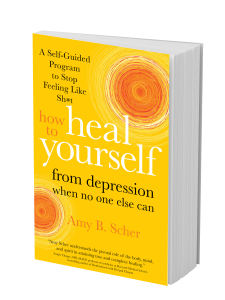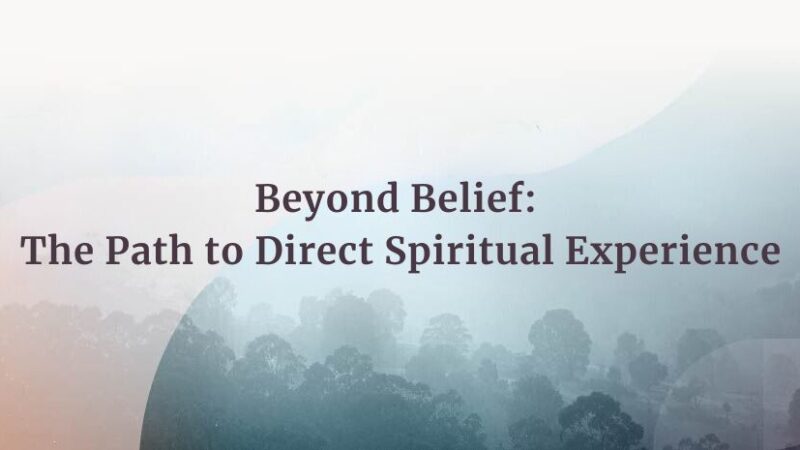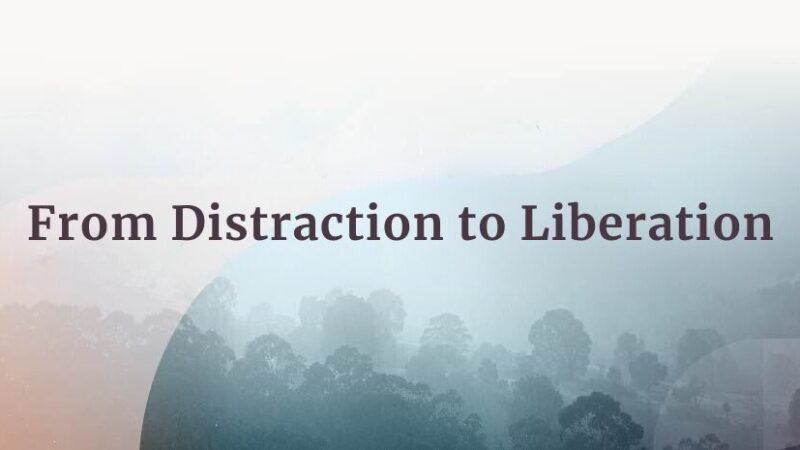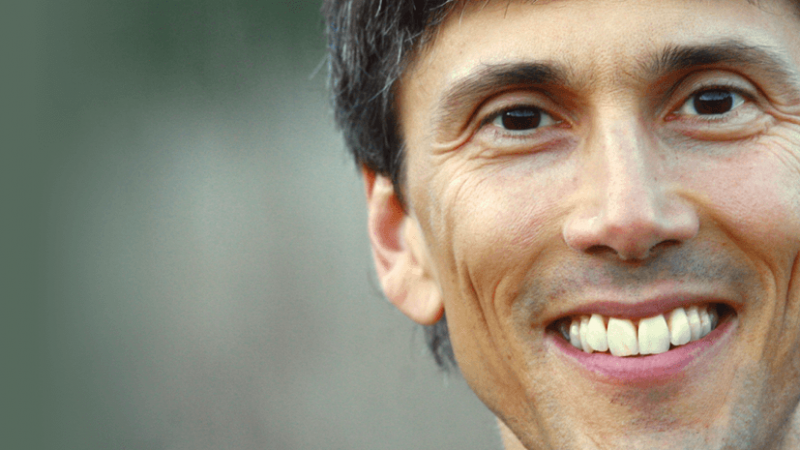-
E91: Allowing Life to Remove Your Blockages
Michael Singer — July 2, 2025
The foundational flaw in human behavior is the belief that "I'm not okay." What follows is the...
-
Cyndi Dale: Becoming Your Own Best Ancestor
Cyndi Dale — July 1, 2025
On the surface, it appears as though the lives we live proceed forward moment by moment in a...
-
Honey Tasting Meditation: Build Your Relationship with Sweetness
There is a saying that goes “hurt people hurt people.” I believe this to be true. We have been...
Written by:
Amy Burtaine, Michelle Cassandra Johnson
-
Many Voices, One Journey
The Sounds True Blog
Insights, reflections, and practices from Sounds True teachers, authors, staff, and more. Have a look—to find some inspiration and wisdom for uplifting your day.
Standing Together, and Stepping Up
Written By:
Tami Simon -
The Michael Singer Podcast
Your Highest Intention: Self-Realization
Michael Singer discusses intention—"perhaps the deepest thing we can talk about"—and the path to self-realization.
This Week:
Cyndi Dale: Becoming Your Own Best Ancestor -
Many Voices, One Journey
The Sounds True Blog
Insights, reflections, and practices from Sounds True teachers, authors, staff, and more. Have a look—to find some inspiration and wisdom for uplifting your day.
Take Your Inner Child on Playdates
Written By:
Megan Sherer
600 Podcasts and Counting...
Subscribe to Insights at the Edge to hear all of Tami's interviews (transcripts available, too!), featuring Eckhart Tolle, Caroline Myss, Tara Brach, Jack Kornfield, Adyashanti, and many more.
Most Recent
E29: Beyond Belief: The Path to Direct Spiritual Exper...
There is a profound relationship between beliefs, faith, and direct spiritual experience. Beliefs are constructs of the human mind and are not truths; they can change. Genuine spiritual understanding comes from direct experience rather than intellectual belief. Experiencing the relationship between energy and consciousness serves to bridge the gap between modern physics and ancient spiritual teachings. Exploring this involves letting go of the ego, staying open, and directly experiencing the inner energy flow that leads to profound self-realization.
For more information, go to michaelsingerpodcast.com.
© Sounds True Inc. Episodes: © 2024 Michael A. Singer. All Rights Reserved.
Gabby Bernstein & Richard Schwartz: Courageous Lo...
Internal Family Systems therapy (or IFS) is transforming the field of psychology, captivating interest among professionals and laypeople alike in the relatively few years since Dr. Richard C. Schwartz first introduced his revolutionary model. Bestselling author Gabby Bernstein proclaims herself to be among the growing number of people whose lives have been improved in seemingly miraculous ways through IFS. In this podcast, Tami Simon speaks with Schwartz and Bernstein about the unique ways in which IFS can heal and deepen our intimate relationships.
Give a listen to this empowering discussion of “Courageous Love,” exploring: breaking the “mono-mind” paradigm; uncovering the core Self; coming into full integration and aligning with the truth of who you are; being Self-led in relationships; a four-step method for engaging compassion, curiosity, connection, and choice; asking yourself, “What do I need right now?”; IFS as a devotional practice; becoming “the primary caretaker of our exiles”; the burden of worthlessness; the intensity of our protector parts; IFS for conflict resolution and the practice of speaking about our parts instead of from our parts; calling a time-out to return to calm and presence; the cumulative nature of the energy of the Self; why we need to dialogue with our parts before we try to discuss them with others; the vulnerability of courageous love; the magic of clarity; and more.
Note: This episode originally aired on Sounds True One, where these special episodes of Insights at the Edge are available to watch live on video and with exclusive access to Q&As with our guests. Learn more at join.soundstrue.com.
E28: From Distraction to Liberation
Spiritual growth involves recognizing and releasing the ego, which is a construct of accumulated experiences and unresolved emotions. True liberation comes from allowing life’s events and emotions to flow through without resistance, enabling one to reconnect with pure, universal consciousness. By shedding the ego and embracing this state, individuals can experience a profound sense of unity and peace.
For more information, go to michaelsingerpodcast.com.
© Sounds True Inc. Episodes: © 2024 Michael A. Singer. All Rights Reserved.
Customer Favorites
Spencer Sherman: The Inner Mastery of Money
Spencer Sherman was named one of the top wealth advisors in the United States, has an MBA from Wharton School, and is the founder of a sustainable financial firm with Buddhist values. With Sounds True, Spencer is the coauthor of The Money and Spirit Workshop. He also is bringing his work on the inner mastery of money to the Inner MBA program, a nine-month training program Sounds True is producing in partnership with LinkedIn, Wisdom 2.0, and MindfulNYU. In this podcast, Sounds True founder Tami Simon speaks with Spencer about how we can shift from having a neurotic, confused, or highly charged relationship with money to enjoying a wise, healthy, and uncharged relationship. Spencer introduces the iceberg metaphor, sharing how our financial literacy doesn’t actually drive our money behaviors as much as our fixed, unconscious beliefs and emotions do. Tami and Spencer also discuss the connections between money and Buddhism, exploring self-worth, fear, generosity, equanimity, and more.
Elizabeth Stanley: Trauma-Sensitive Mindfulness
Elizabeth Stanley is a Georgetown University professor and the creator of Mindfulness-based Mind Fitness Training (MMFT)®, an approach taught to thousands in civilian and military high stress environments. A U.S. Army veteran with service in Asia and Europe, she holds degrees from Yale, Harvard, and MIT. She is the author of the book, Widen the Window: Training Your Brain and Body to Thrive During Stress and Recover from Trauma. In this podcast, Tami Simon speaks with Elizabeth Stanley about her 8-session online course, Mindfulness-Based Mind Fitness Training: A Trauma-Sensitive Online Course to Build Resilience and Thrive During Stress. They also discuss why MMFT is a practice we can all benefit from; the value of expanding our “window of tolerance”; the relationship between personal agency and trauma; the “thinking” brain versus the “survival” brain; when stress becomes trauma; the importance of recovery from stressful situations; and more.
The Trauma-Trigger Cycle
When you are stuck with old unprocessed experiences living inside you, they can create what I call a trauma-trigger cycle because they are still very much alive in our systems.
Here’s my analogy to help you understand how this works and why it causes so much trouble. Imagine that you have a very difficult experience, for example, having to say goodbye to a sick pet. All of the details in the form of individual feelings, smells, images, sounds, and more get bundled up and deposited into a metaphorical glass trauma capsule—which gets stored in the body. It sits there with all of the old feelings we experienced at the time the event happened. While you might not be aware of it constantly, you are likely feeling those emotions at a low level all the time. When any current situation reminds you of any of those details hanging out in the capsule—either consciously or subconsciously—the old trauma gets “poked,” or reactivated. This is how we get triggered. Being triggered can bring up flashes of those memories, including images, feelings, and any sensory stimuli.
For the most part, except in certain cases of post-traumatic stress disorder (PTSD) from major life events, where sometimes the trigger is known, this trauma-trigger reaction actually happens at a subconscious level, outside of your awareness. Even in obvious situations, you may think you know what the trigger is, and try to avoid it, but it may be something totally different that got stuck in the metaphorical glass trauma capsule. Often, people come to me and say, “Nothing set this off,” “I’m depressed for no reason,” or “I suddenly started feeling terrible but nothing happened.” While this may seem true, I can bet on the fact that while the bad feelings might seem random, they are being triggered in some way that you simply haven’t yet identified. Triggers can be foods, colors, smells,sounds, weather, or anything, really! Finding and resolving triggers can become almost an entertaining game if you let it.
As you can imagine, this entire trauma-trigger dynamic is very unsettling and unpredictable—which can feel like danger to your system and keep you stuck in that freakout response. Not only that, but in this state, you can actually be excessively tuned in to your trauma, seeing reminders of it everywhere, which further traumatizes you.
I had an experience after going through a loved one’s difficult health crisis where every single place I looked, I saw reminders of the experience. And for someone who wonders if everything is some greater “sign from the Universe” (fact: not every single thing is) or my intuition is trying to get my attention because another loved one might be in danger (second fact: trauma and fear clouds intuition), it felt like torture to me. I kept meeting people who had the same illness that my loved one had had, saw posters and billboards advertising medications for the condition, and more. As a distraction while on vacation, I had deliberately picked out several seemingly lighthearted books to take—and it turned out a character in every single book had that same medical condition! I was constantly on edge and further traumatized by all of these things. This is a perfect example of what happens to us in a traumatized state: we become highly attuned to the world around us, perhaps subconsciously scanning for danger, but in the process, we see and get triggered by everyday things we’ve probably passed by a million times before. I realized that had I been tuned in to any other single thing out in the world, like peaches, I likely would have seen that everywhere. This recognition actually led to a funny mantra I used during that time to keep things light while I did the deeper healing work: Look for the peaches! But in all seriousness, what happened as I worked to release the trauma, just like you’ll be doing in this chapter, was that I stopped seeing reminders of it. I have to be honest in that this took months of using energy therapy in different ways to overcome the trauma I had experienced, like you’ll be learning soon—but it worked. Did all the people with this condition go away? Did all the billboards get taken down? No. The less traumatized I became, the less heightened my sensitivity to it was. This is a perfect example of why it’s essential to work with unprocessed experiences.
Emotional memory is stored throughout the entire body. Thanks to the work of Candace Pert, we know that “unexpressed emotions from experiences can get stuck in the body at the level of cellular memory.” This is such a simple explanation for why we feel bad when we haven’t resolved our past experiences. We are still quite literally feeling them. And even if it’s at a subtle level, it may only take a “trigger” from that metaphorical glass capsule to awaken it.
While your own unprocessed experiences may not disrupt your life in the way that clinically diagnosed PTSD does, you may relate to what it feels like to have PTSD, when one or a few memories from life takes over all of it. This is, again, why we must deal effectively and consistently with our emotions instead of suppressing them. Otherwise, we are at risk of our emotions becoming part of future unresolved experiences.
Even knowing all of this, there’s no need to panic. Again, not all experiences traumatize you. And, not all traumas will need to be dealt with in order to get you feeling better. But the ones that do need careful attention. I want you to understand that by working with trauma, we are not trying to force a positive perspective on it or make you be okay with something bad that happened to you. Not at all. What we want to do is release the stress it’s causing you, even if that stress is undetected consciously. We don’t want these traumas taking up space and energy in your body anymore or triggering you without your knowledge.
Working with unprocessed experiences will help empty the metaphorical glass trauma capsule so we stop becoming triggered by the world around us. In other words, you’ll be seeing peaches more easily instead of trauma triggers.
This is an excerpt from How to Heal Yourself From Depression When No One Else Can: A Self-Guided Program to Stop Feeling Like Sh*t by Amy B. Scher.
 Amy B. Scher is an energy therapist, expert in mind-body healing, and the bestselling author of How to Heal Yourself When No One Else Can and How to Heal Yourself from Anxiety When No One Else Can. She has been featured in the Times of India, CNN, HuffPost, CBS, the Washington Post, Cosmopolitan, the Los Angeles Review of Books, Curve magazine, and San Francisco Book Review. Scher was also named one of the Advocate’s “40 Under 40.” She lives in New York City. For more, visit amybscher.com.
Amy B. Scher is an energy therapist, expert in mind-body healing, and the bestselling author of How to Heal Yourself When No One Else Can and How to Heal Yourself from Anxiety When No One Else Can. She has been featured in the Times of India, CNN, HuffPost, CBS, the Washington Post, Cosmopolitan, the Los Angeles Review of Books, Curve magazine, and San Francisco Book Review. Scher was also named one of the Advocate’s “40 Under 40.” She lives in New York City. For more, visit amybscher.com.

Learn More
Sounds True | Amazon | Barnes & Noble | Indiebound | Bookshop






